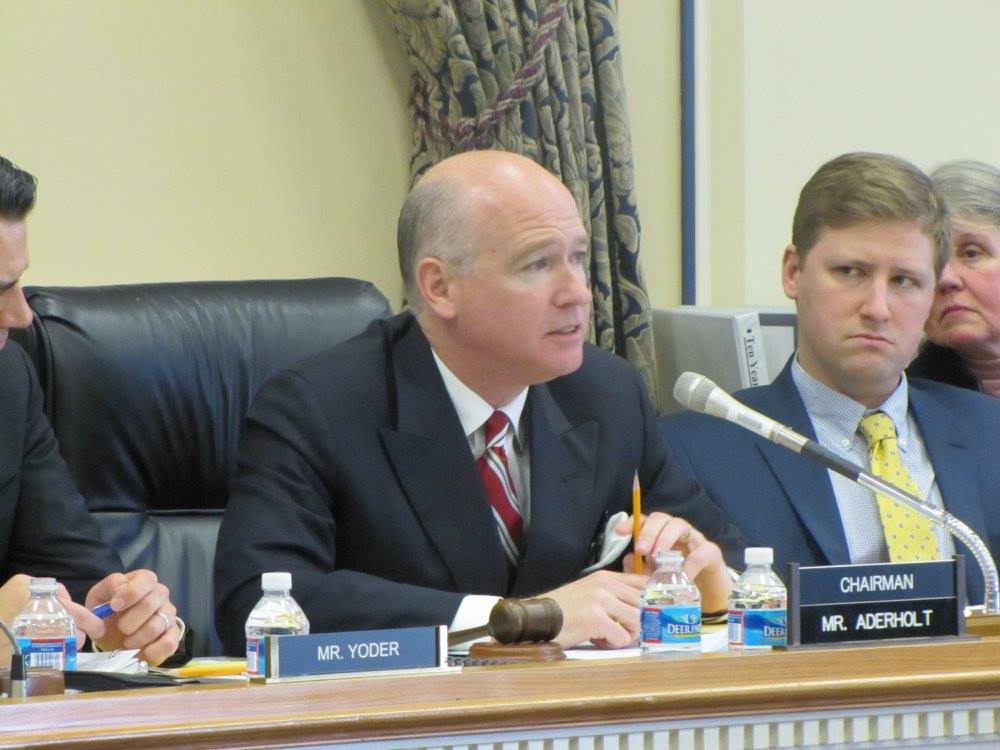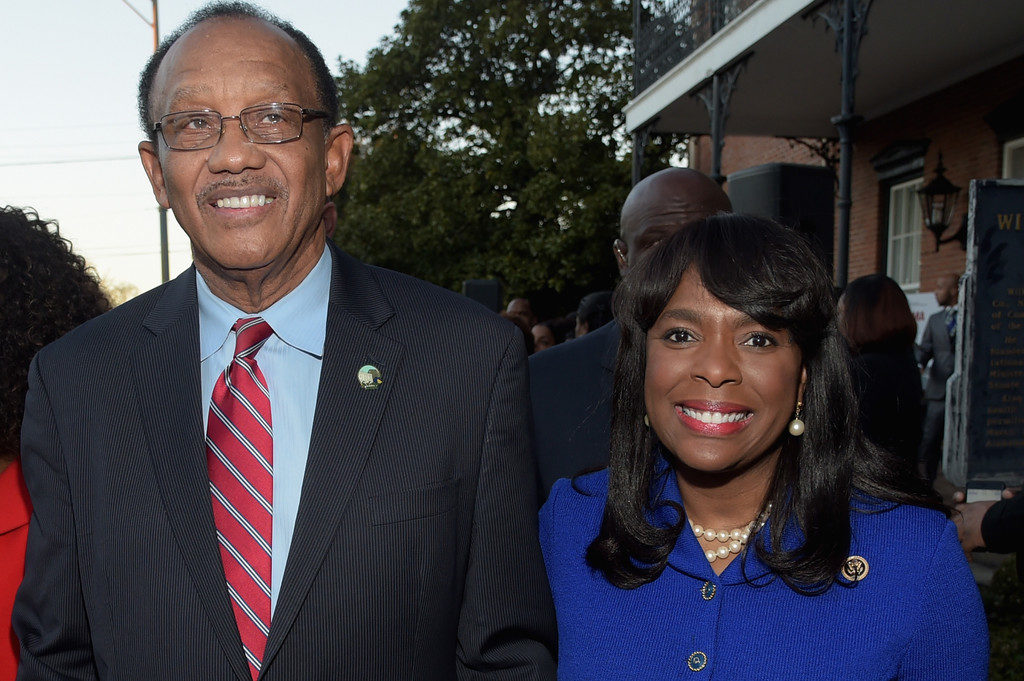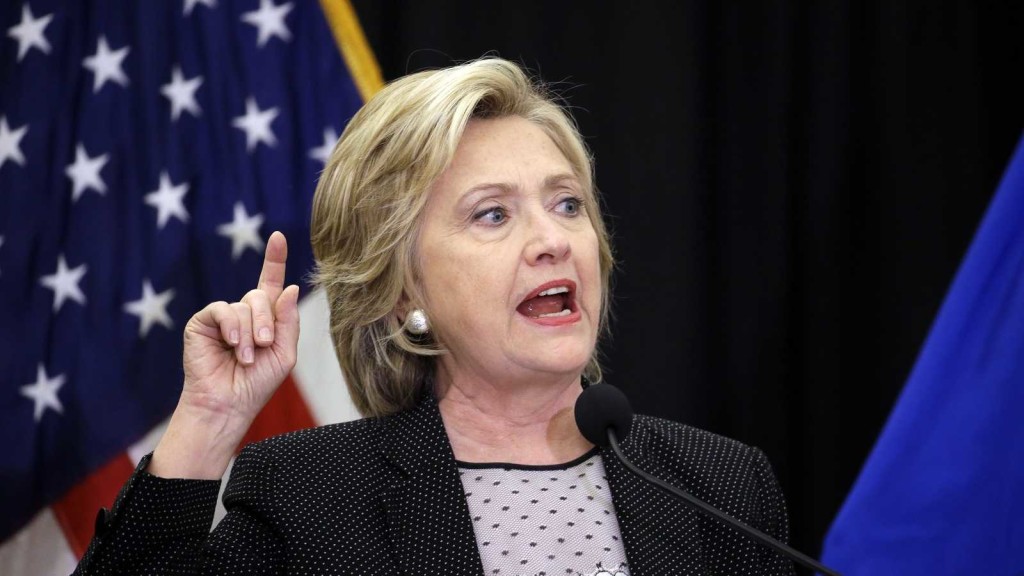Donald Trump’s new agriculture brain trust includes Alabama’s Robert Aderholt

Agriculture is vital to the Yellowhammer State. In fact, the agriculture industry boasts over 500,000 jobs and brings in more than $70 billion total a year to Alabama. Alabama 4th District U.S. Congressman Robert Aderholt knows this well. A member of the powerful House Committee on Appropriations, Aderholt serves as chairman of the Subcommittee on Agriculture, where he supports greater transparency, accountability and oversight to the appropriations process. Thus when Republican Presidential nominee Donald Trump named Aderholt to his new agricultural advisory committee on Tuesday, one can’t help but think it’s a natural fit. Trump, looking to improve public opinion with voters across the country, especially in rural swing states, named over 60 members to the newly formed committee. Tasked with pioneering new ideas to strengthen America’s agricultural industry, the committee also will provide support to our rural communities. “The members of my agricultural advisory committee represent the best that America can offer to help serve agricultural communities,” Trump said in a statement. “Many of these officials have been elected by their communities to solve the issues that impact our rural areas every day. I’m very proud to stand with these men and women, and look forward to serving those who serve all Americans from the White House.” Aderholt is the second member of Alabama’s Congressional delegation to serve as a Trump adviser. Alabama U.S. Sen. Jeff Sessions, an early Trump supporter, was tapped to advise the nominee on foreign policy and immigration earlier this year.
Bob Sparks: Donald Trump campaign shakeup — will it be enough?

Donald Trump and his campaign are sending a signal with the announcement of Steve Bannon as campaign CEO and Kellyanne Conway as campaign manager. Aside from the clear message that his is a campaign in trouble, it also provides a clear picture of a major focus of his campaign going forward. That focus is to make the election about Hillary Clinton and not Donald Trump. So far, Trump’s world-class lack of discipline has kept the spotlight on himself. There can be little doubt that Bannon has been brought on board to change that dynamic. If the candidate will cooperate and refrain from responding to criticism from Gold Star families, it will be interesting to see if this move works. “It’s an expansion at a busy time in the final stretch of the campaign,” Conway told The New York Times. Bannon is fairly well-known in conservative circles as the Executive Chairman of Breitbart News, the media outlet liberals love to hate. Even some conservatives were unhappy with Breitbart’s softness for Trump during the primaries. No one is talking about Bannon’s accomplishments as a conservative filmmaker, but they should. His skill in that area will make him invaluable to Trump. That is if the candidate will cooperate. Bannon’s most recent work is the film version of Peter Schweizer’s New York Times best-selling book, Clinton Cash. The findings of Schweizer and his team at the Florida-based Government Accountability Institute (co-founded with Bannon) have given Trump and Republicans fodder for op-eds and TV ads for months. (Full disclosure: I represent a group from Japan that translated and published Clinton Cash in that country.) The book and the film chronicle the questionable donations to the Clinton Foundation from foreign governments doing business with the U.S. while Clinton was Secretary of State. Clinton is clearly vulnerable to political attacks on the activities of the Foundation. Millions of dollars have come into Foundation from some governments which operate on the notion that being gay is punishable by death. Or women are not even second class citizens. Those are in addition to the almost daily revelations provided by the release of still more emails. For those who like to fall back on the notion that only Fox News is talking about this, think again. The Boston Globe, no conservative organ, published an editorial Wednesday calling for the Foundation to stop accepting donations. Now. These should be the gifts that keep on giving for Trump. Instead, his instinct has been to talk about Clinton and President Barack Obama being the “founders of ISIS” during his most recent Florida swing. This is the state of the playing field as Bannon enters the game. If Bannon can keep Trump on message, a huge undertaking, we should expect television and online ads taking the most devastating snippets from the film. His imprint will be on other ads as well. Conway brings campaign experience, including decades as a pollster. She is also a frequent guest pundit on political shows. We will soon see if Trump puts his faith in his “core four” of Bannon, Conway, campaign chairman Paul Manafort and his deputy Rick Gates. If Conway becomes the most frequent spokesperson, then despite denials, Manafort’s role has likely changed. Manafort is under scrutiny for his role in helping the pro-Russian government in Ukraine (at the time) direct undisclosed payments to U.S. lobbying firms. This dynamic will make him unable to effectively represent the campaign in media interviews, especially the Sunday shows. How does the Trump campaign talk about the Clinton Foundation while its campaign chairman is being peppered with questions by those seeking to create a moral equivalence between the two? The answer: by keeping the chairman under wraps. This is clearly Trump’s last chance to be relevant. It may already be too late, but with an opponent as flawed as Hillary Clinton, anything is possible if the focus stays on her. Only in America.
Terri Sewell endorses Selma Mayor George Evans in third re-election bid

Alabama 7th District U.S. Congresswoman Terri Sewell endorsed current Selma Mayor George Evans Tuesday in his third re-election campaign. “I am proud to endorse George Evans for re-election as Mayor of my hometown of Selma,” said Sewell in a statement of endorsement. “I have known Mayor Evans all my life and he has always been a strong voice and a tireless fighter for the people of Selma.” It’s a crowded field of candidates vying for the position of Selma mayor, with four candidates running against Evans — Ward 3 Selma City Councilman Greg Bjelke, Baptist minister Jerria Martin, State Rep. Darrio Melton and former Selma mayor James Perkins Jr. But Sewell believes Evans is best for the job. “From his demonstrated efforts to revitalize downtown Selma to his dedicated commitment to making our community stronger and safer, Mayor Evans has earned a third term to continue the progress that he has made in the areas of economic development, education, infrastructure and public safety,” Sewell explained. Sewell went on to explain throughout his tenure Mayor Evans has worked hard to bring federal jobs and resources to Selma. “We share a real love for Selma and a passionate desire to move this City forward,” Sewell continued. “Mayor Evans stood with me and President Obama to commemorate the historic significance of the events that occurred in Selma over 50 years ago and he was a fearless advocate with me in making the case to Obama cabinet officials from HUD, DOT, and Agriculture to bring more federal resources to Selma so that our community can thrive for future generations.” Sewell concluded, “Mayor George Evans believes in Selma and I strongly support his re-election so that we can continue working together to provide better opportunities to the people of Selma and Dallas County.”
UAB space archaeologist Sarah Parcak on a mission to unearth Peru’s lost civilizations

World-renowned “space archaeologist” and UAB professor Sarah Parcak is mission-focused: to find hundreds of thousands of lost, ancient sites buried beneath the earth before looters do. No easy feat, Parcak, the 2016 TED Prize winner — a highly-coveted $1 million grant that is awarded annually to one exceptional individual whose creative, bold vision sparks global change — will use her winnings to create an online tool that will train and enlist an army of volunteers across the globe to aid in her quest. Parcak announced the platform, Global Xplorer, at the recent TED Summit in Canada. There, she explained the platform will partner with DigitalGlobe and National Geographic, also working closely with UNESCO, and will allow anyone to help discover unknown archaeological sites. Archaeologist, together with citizen scientists, will help discover previously unknown sites and track looting of known sites. Across the globe, the UAB archaeologist is already helping countries preserve history by using satellites identifying ancient sites lost in time. In Egypt alone, Parcak helped locate 17 potential pyramids, plus an additional 1,000 forgotten tombs and 3,100 unknown settlements. She’s discovered even more throughout the Roman Empire. Sarah “uses 21st century technology to make the world’s invisible history visible again,” the TED blog explained. In the first exploration with Global Xplorer, Parcak said she and her team will look to map an entire country, Peru — the home of Machu Picchu, the Nazca lines and other archaeological wonders waiting to be discovered. “We will do nothing less than use state-of-the-art technology to map an entire country,” said Parcak at the TED Summit. “This is a dream started by Hiram Bingham, but we are expanding it to the world, making archaeological exploration more open, inclusive, and at a scale simply not previously possible.” Slated to launch January 2017, the platform will be available in both Spanish and English, it will be accessible to people in Peru and across Latin America with plans to include more and more languages over time. Those interested, may join the project by clicking here. You can watch Parcak’s latest TED Ted about the Global Xplorer project, from the recent TED Summit here: Noteworthy updates include: Global Xplorer will launch in Peru and use state-of-the art satellite technology to map the entire country – an archaeological feat more open, inclusive and advanced than anything before
Alabama House to debate how to spend BP oil spill settlement

The Alabama House Ways and Means Committee approved a plan on Tuesday for spending Alabama’s settlement money from the 2010 Deepwater Horizon “BP” oil spill in the Gulf of Mexico. The plan, devised primarily by Ozark-Republican and Committee Chairman Steve Clouse, calls for the state to create a $639 million bond issue and apply the BP payments to pay off the bonds. Under the plan, $450 million of the settlement would be used for debt repayment and nearly $200 million toward road projects in coastal counties. Clouse, said paying debt early would free up state funds and provide nearly all of additional $85 million in funding requested by Alabama Medicaid, by creating a surplus of $70 million in this year’s budget and next year’s budget. The House approved a similar plan in April, but the spending proposals fell apart over a disagreement between northern and southern Alabama lawmakers over how much money should be spent on state debt versus road projects in south Alabama. House and Senate Republicans plan to meet Wednesday to discuss a workable agreement. A vote on the bill could come as early as Wednesday.
Why it matters: America’s opioid epidemic

THE ISSUE: More Americans are dying from opioids than at any time in recent history, with overdose deaths hitting a peak of 28,000 in 2014. That amounts to 78 Americans dying from an opioid overdose every day, according to the Centers for Disease Control and Prevention. The CDC uses opioid as an umbrella term for synthetic painkillers and for drugs derived naturally from opium (known more specifically as opiates), such a heroin. It’s not just the use of illicit opiates like heroin that is on the rise – overdose deaths from prescription painkillers have quadrupled since 1999, tracking a similar increase in the amount of these drugs being prescribed by doctors. — WHERE THEY STAND Donald Trump sees his plans to build a wall along the Mexican border as essential to stopping the flow of illegal drugs into the country. The Drug Enforcement Administration reports the seizure of drugs at the Southern border quadrupled between 2008 and 2013. Hillary Clinton proposes spending $10 billion to tackle the drug crisis. Her plan would send more money to states to expand drug treatment and mental health services, promote greater availability of the overdose reversal drug naloxone and support better prevention programs in schools, among other things. — WHY IT MATTERS More than 2.4 million Americans were addicted to synthetic pain relievers or heroin in 2014, according to the latest federal survey on drug use and health. And that number excludes the millions more – family members, first responders, taxpayers – who feel the ripple effects of addiction in their daily lives. Clinton has called drug addiction a “quiet epidemic.” But it’s one that’s getting louder, as more and more Americans share their stories and prove that drug addiction follows no standard profile of age, race or class. For decades, drug addiction was viewed as a criminal justice problem, not a health one. The stigma is lessening, but many states simply don’t have the capability to provide treatment and recovery for people who need it, leaving police departments and emergency rooms to fill the void. Lawmakers and advocates are fighting for precious tax dollars to expand services, but the 2015 National Survey on Drug Use and Health found that just 0.9 percent of people seeking treatment for a problem related to drugs or alcohol received it. Experts now believe the sharp increase in prescribed painkillers is to blame. People are quick to share stories of being prescribed dozens of pills for pain relief following procedures as simple as wisdom teeth removal. The strength of these medications can easily cause addiction, forcing many people to turn to a cheaper alternative – heroin – when their prescriptions run out. Roughly 75 percent of new heroin users report first using prescription opioids, the government says. Lawmakers are beginning to take notice: At the meeting of the National Governors Association in July, 45 governors signed on to a compact aimed at tightening prescribing rules. Several attorneys general are engaged in or considering waging legal battles against major pharmaceutical companies, alleging they played down the risks of addiction when marketing their painkillers. At the same time, the illicit drugs people are turning to are becoming even more deadly. The synthetic painkiller fentanyl, which is up to 50 times as potent as heroin, is now being manufactured illegally. By sight, it’s impossible to tell the difference between heroin and fentanyl, leaving people unaware of the deadliness of the drugs they are consuming. Northeastern and Midwestern states, such as New Hampshire and Ohio, are seeing a dramatic rise in the use of fentanyl. More than 5,000 people nationwide died from a synthetic opioid like fentanyl in 2014, and that number is only on the rise. As most politicians know, families and communities are demanding change, and fast. Republished with permission of the Associated Press.
Grocery tax persists in Alabama, ‘punishes’ those on fixed incomes

Alabama is one of only thirteen states across the country who taxes the sale of groceries. According to the Tax Foundation, Alabama, Hawaii, Idaho, Kansas, Mississippi, Oklahoma and South Dakota tax groceries at the same rate as the sales tax on all purchases, which puts a disproportionate burden on the poor, which may affect the quality of food they can afford to put on the table. Stateline, an online site of The Pew Charitable Trusts, takes a deeper look at the states that continue to charge a grocery state, focusing on the Yellowhammer State: In Alabama, most of the sales tax goes toward education. And Nancy Dennis, spokeswoman for the Alabama Retail Association, noted that every time the sales tax goes up, retail sales go down. That worries both retailers and educators in the state. “The kicker here is where the replacement tax revenue is going to come from,” she said. “Alabama, like many states, is in budgetary crisis. So if legislators take away revenue, it’s not going to help solve their problems in continuing to help fund the state.” Alabama State Sen. Gerald Dial is one legislator who would like to see the tax eliminated. The tax, Dial told Stateline, is “the most regressive tax you can have and punishes those on fixed income.” Dial knows the facts — households across the country spend more money on food when incomes rise, but food represents a smaller portion of income as they allocate additional funds to other goods. For poorer household, the food budget represent a larger percentage of their income in order to feed their families. According to the U.S. Department of Agriculture, the lowest-income Americans spent an average of $3,667 on food in 2014, amounting to 34.1 percent of their income, . In contrast, middle-income families spent an average of $5,992 on food, or 13.4 percent of income. Despite the facts against the tax, and a handful of lawmakers like Dial fighting against it, it doesn’t look like the grocery tax is going away any time soon in Alabama. For a state with a perennial budget shortfall, the tax provides a steady and secure stream of revenue. Here’s a look at where groceries are taxed in America:
Hillary Clinton camp pushes back as GOP challenges FBI, seeks probe

Hillary Clinton‘s campaign is pushing back against congressional Republicans who have challenged the FBI’s decision not to pursue criminal charges against the Democratic presidential nominee and have pressed for yet another investigation. Having failed to find evidence to support their claims that Clinton was negligent in preventing or stopping the deadly 2012 terrorist attack on the U.S. diplomatic facility in Benghazi, Libya, Republicans are now focused on whether Clinton shaded the truth about her haphazard handling of emails containing government secrets. Furious the FBI didn’t press charges against their political rival, House GOP members asked the agency for notes from its agents’ July interview with Clinton. The FBI provided Congress on Tuesday with a raft of documents from its yearlong investigation that it wrapped up last month. Republicans claim the FBI notes, which are typically kept confidential, may show Clinton provided inconsistent answers to questions about her handling of emails containing classified information during testimony last year before the House Benghazi panel. Democrats, meanwhile, expressed concern that the Republicans would leak snippets of the classified materials carefully selected to make the presidential candidate look bad without providing a fair account of what happened. Clinton spokesman Brian Fallon said Tuesday the campaign would like the FBI notes to be publicly released in full. “This is an extraordinarily rare step that was sought solely by Republicans for the purposes of further second-guessing the career professionals at the FBI,” Fallon said. “We believe that if these materials are going to be shared outside the Justice Department, they should be released widely so that the public can see them for themselves, rather than allow Republicans to mischaracterize them through selective, partisan leaks.” A spokeswoman for the Republican-led House Oversight and Government Reform Committee said that the panel’s staff is reviewing documents that are classified as secret. Rep. Adam Schiff of California, the top Democrat on the House Intelligence Committee, said in a statement that the panel received “FBI witness interview reports, including that of Secretary Clinton’s interview, along with other materials from the FBI’s now closed investigative file.” The FBI, in a statement, made clear that it expected lawmakers to use the documents for oversight and not to selectively leak details three months before the election. “The material contains classified and other sensitive information and is being provided with the expectation it will not be disseminated or disclosed without FBI concurrence,” the agency said. The FBI last month closed its yearlong probe into whether Clinton and her aides mishandled sensitive information that flowed through a private email server located in the basement of her New York home. Though he described Clinton’s actions as “extremely careless,” FBI Director James Comey said his agents found no evidence of criminal wrongdoing. Clinton said last year that she turned over all 55,000 pages of work-related emails from her server, but said she deleted thousands more she and her lawyers deemed as personal. Clinton also says she never sent any information by email that was marked as classified. More than 100 emails exchanged by Clinton were subsequently reviewed and determined to contain information considered classified. As evidence Clinton lied, Republicans point to three email chains forwarded to Clinton that contained paragraphs marked “(C),” signifying they contained classified information. Rep. Elijah E. Cummings, the ranking Democrat on the House oversight committee, said Clinton did not originate the three email chains in question, which were forwarded to her private account by aides. He said only one of those emails was later determined by the State Department to contain classified information. “The FBI already determined unanimously that there is insufficient evidence of criminal wrongdoing,” said Cummings, D-Md. “Republicans are now investigating the investigator in a desperate attempt to resuscitate this issue, keep it in the headlines, and distract from Donald Trump’s sagging poll numbers.” State Department spokesman Mark Toner said Tuesday that the FBI allowed the department to review emails the agency is providing Congress. “I think we’re satisfied after having reviewed these emails that the FBI has made arrangements that the documents will be transmitted subject to appropriate handling controls,” he said, adding that the department respects the FBI’s desire to accommodate the requests of its congressional oversight committees. Toner said, however, that the department is still discussing with the FBI the release of additional notes from the interviews investigators did with Clinton and her aides. The announcement comes as the conservative group Judicial Watch announced that it would receive copies of thousands of previously undisclosed work-related emails sent or received by Clinton. The emails, recovered as part of the FBI’s probe, were recently returned to the State Department. Republished with permission of the Associated Press.
Donald Trump shakes up campaign staff again

Republican presidential nominee Donald Trump, who has slipped in the polls in recent weeks, has shaken up his campaign again. The billionaire real estate mogul is bringing in Stephen Bannon of Breitbart News as chief executive officer and promoting pollster Kellyanne Conway to campaign manager. “I’ve known both of them for a long time. They’re terrific people, they’re winners, they’re champs, and we need to win it,” Trump told The Associated Press in a phone interview early Wednesday. The move comes just 82 days before the November election and represents yet another overhaul of Trump’s tumultuous quest for the White House. Campaign chairman Paul Manafort, who formally took over the reins following the departure of Corey Lewandowski in June, will maintain his current title, Trump said. Manafort deputy Rick Gates, who has been traveling often with Trump, is expected to maintain a senior role with the campaign. The news, first reported by The Wall Street Journal, comes as opinion surveys show Trump trailing Hillary Clinton nationally and in a host of key battleground states following a difficult campaign stretch that saw him insulting the Muslim parents of a soldier who died in Iraq and temporarily refraining from endorsing House Speaker Paul Ryan, who was involved in a primary in his home state of Wisconsin. In tapping Bannon for a top campaign role, Trump is doubling down on his outsider appeal rather than appeasing more traditional Republicans. The conservative Breitbart figure has been a cheerleader for Trump’s campaign for months and was critical of Republican leaders, including Ryan. Bannon is a former Goldman Sachs banker but does not bring presidential campaign experience to Trump’s White House bid. Conway joined Trump’s campaign earlier this year as a senior adviser. A longtime Republican strategist and pollster, she has close ties to Trump’s running mate, Indiana Gov. Mike Pence. Trump long has resisted pleas from fellow Republicans to overhaul the flame-throwing approach on the campaign trail that powered his surge to the top of the GOP field in the primary season. Instead of working to broaden his appeal, Trump has largely hewed to the large rallies and attention-grabbing comments that appealed to the Republican Party base. “You know, I am who I am,” he told a local Wisconsin television station Tuesday. “It’s me. I don’t want to change. Everyone talks about, ‘Oh, well you’re going to pivot, you’re going to.’ I don’t want to pivot. I mean, you have to be you. If you start pivoting, you’re not being honest with people.” Conway called the moves “an expansion at a critical time in the homestretch.” Details of the new pecking order were hashed out at a lengthy senior staff meeting at Trump Tower Tuesday while Trump was on the road. Additional senior hires are expected in the next few days. Trump, whose campaign is built on his persona as a winner, said several times Wednesday that the campaign was “doing well,” and said his speech hours earlier in Wisconsin Tuesday was well-received. “We’re going to be doing something very dramatic,” Trump added. Trump’s campaign announced earlier that it would finally begin airing its first ads of the general election next week in Florida, Ohio, North Carolina and Pennsylvania. While polls have shown Clinton building a lead following the Philadelphia convention, Democrats are fearful that a depressed voter turnout might diminish support among the minority, young and female voters who powered Obama to two victories. Clinton said at a voter registration event at a Philadelphia high school that she’s “not taking anybody anywhere for granted” in the race for the White House, saying the stakes “could not be higher.” In the Wisconsin outing Tuesday, Trump accused Clinton of “bigotry” and being “against the police,” claiming that she and other Democrats have “betrayed the African American community” and pandered for votes. “We reject the bigotry of Hillary Clinton, which panders to and talks down to communities of color and sees them only as votes — that’s all they care about,” the GOP nominee said in remarks delivered not far from Milwaukee — the latest city to be rocked by violence in the wake of a police shooting. Trump has been lagging in the polls since he was crowned the GOP standard-bearer in Cleveland last month. He charged that Clinton has been on the side of the rioters in Milwaukee, declaring: “Our opponent Hillary would rather protect the offender than the victim.” “The riots and destruction that have taken place in Milwaukee is an assault on the right of all citizens to live in security and to live in peace,” he said. Clinton campaign spokeswoman Jennifer Palmieri responded with a statement early Wednesday accusing Trump of being the bigot instead. “With each passing Trump attack, it becomes clearer that his strategy is just to say about Hillary Clinton what’s true of himself. When people started saying he was temperamentally unfit, he called Hillary the same. When his ties to the Kremlin came under scrutiny, he absurdly claimed that Hillary was the one who was too close to Putin. Now he’s accusing her of bigoted remarks — We think the American people will know which candidate is guilty of the charge,” she said. Republished with permission of the Associated Press.

